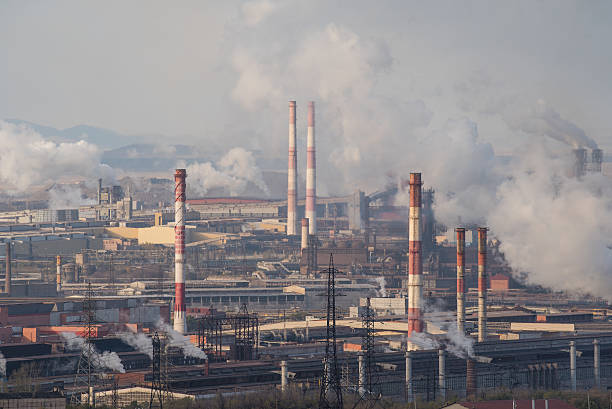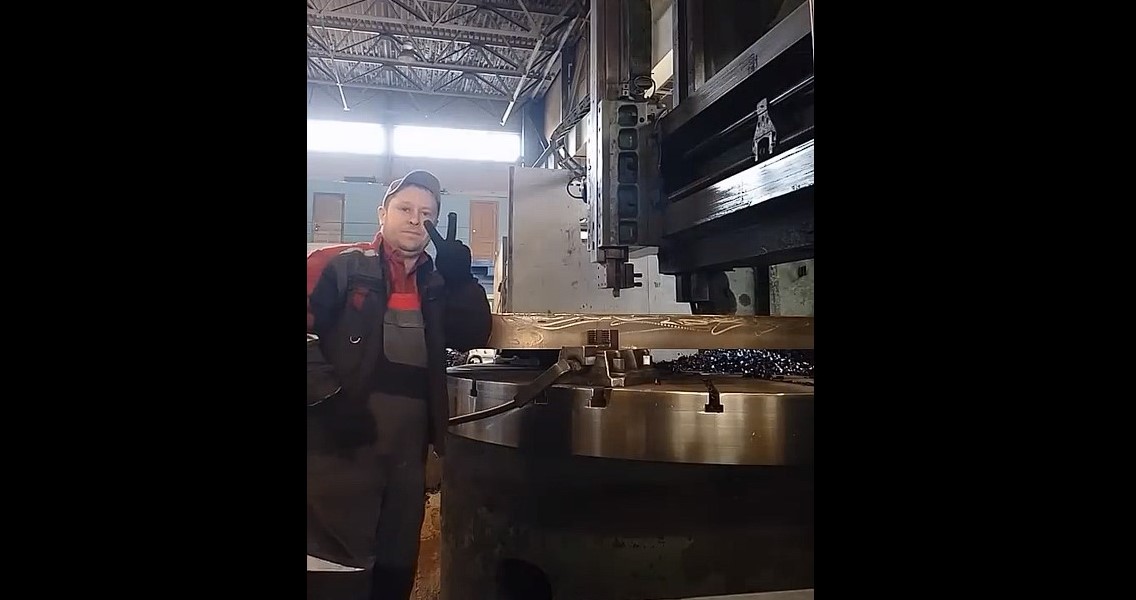In the second and last article from “SERGEI” in Russia, he shares his insights on the position of older workers in the country, as expressed by one popular social media content creator. He also looks at trade union militancy in Russia, attitudes towards the “Special Military Operation” and the prospects for future struggles. Read Part one here [featured photo is of Alexander,(“Sanek”) a lathe operator in Chelyabinsk in the Ural mountain region]
********
Problems of older workers
The older generation is also looking for an opportunity to speak out about what is bothering the working man. Recently, 40-year-old lathe operator Alexander (or Sanek for short) created his own YouTube channel. He is from Chelyabinsk, [in the Urals – ed] but for many years he travelled on shifts. “A pauper in his own country, but I work at a factory. My story” is a video in which Sanek responds to Russian officials’ reproaches towards the youth. They say that the youth do not want to work, are going crazy from being too fat and only want to have fun and film their Tik – Toks rather than toil at the factory. Alexander supports the youth and says that this is all natural.
The hard life of a Urals worker, and his observations and experiences, are more illustrative than any statistics. Until recently, the typical salary of a skilled worker at a plant was 20-30 thousand rubles. Alexander remembers how he walked home from the plant to his pregnant wife with 30 thousand in his pocket. The salary was only enough to pay off debts and rent. Out of despair, he sat down on a bench and cried. How can a man who works on a huge machine the size of a two-story house receive such pennies?
After that, he left the plant for a private company, where he could earn up to 70,000 rubles with overtime. But prices were rising, and wages were not. Sanek decided to go on a shift that lasts 60 days followed by 30 days off. He earns 130-140 thousand per month. His channel is mainly dedicated to the shift method of work and he talks about the intricacies of employment and pitfalls.
Having visited many enterprises, he notes characteristic moments of working life. At factories, payment is by piece-work. Some orders are more profitable work but old-timers snatch perks for themselves and do not allow young people to earn a normal living. Something like hazing is formed, and grabbers and greedy people stand out in the team. A deal divides the team and makes you see a colleague as a competitor. I can confirm all of this.

The very existence of shift work also divides workers. Factories hire more casual “shift workers” when they need to fulfil a large order or when there is a shortage of skilled workers in the region. It turns out that a shift worker gets 200 thousand, and a local gets 40-50. Sanek kept a crowbar with him, because there were cases when locals took it out on the “rich” shift workers. And all this for the same job.
Sanek says bitterly that workers used to fight for an 8-hour workday, for free time. Now many of them go to work on weekends and take overtime, to earn more.
A desire to forget
Another problem is drunkenness. 50 thousand in 2024 is not a salary; it is scarcely even a minimum wage. Predictably, there is a desire to forget. But workers who turn to drink don’t care about themselves anymore and they will not change anything.
Alexander constantly scolds the government and the “bald one” who created such a life for workers. And he is clearly critical of the “Special Military Operation” (SMO). Until 2022, such an attitude towards the government was normal and natural. But not everyone who scolds the authorities and the government is a rebel. Partly, such talk this is just letting off steam. Such a chatterbox says that everyone is an idiot except him, but when you suggest doing something or when something happens, he puts his head in the sand.
Alexander even elicited such a category: “production slaves”. A production slave is characterized by chatter, drunkenness, lack of initiative, running to the shower half an hour before the end and standing at the checkpoint, waiting for the end of the shift.
When communicating with the audience, Sanek reads out comments. One subscriber said that he went to quit because he earned 50,000 rubles. His boss told him: “What’s wrong? You have such a good salary!” And when Alexander himself quit, his boss told him: “I had high hopes for you.” The bosses don’t think about the lives of workers at all, how much they earn, how they live. They consider workers to be second-class people who live somehow, scurrying around.
Why can there be support for Putin and the Special Military Operation (SMO) among workers?
You need to understand what kind of past the old workers had. In the past, factories were closing, and those that remained turned into garbage dumps. As the old people at my factory told me: wages were paid in vodka cards or Chinese consumer goods, since the factory traded with China. Some of the Chinese junk was sold to profiteers and exchanged for vodka. Drunkenness was rampant in the workshops; many people’s hands were shaking so much that it was impossible to work without downing a glass of vodka first. There was dirt everywhere, and part of the factory was rented out. And this is not that bad, because the wages there were paid in principle, under the red director.

[photo – istock]
What happened under Putin? The factory began to pay normally, began to look like an enterprise, and gradually developed, it is a defence enterprise, of course, but still it is not surprising what feelings arose in some workers and management.
The 90s were years of national humiliation. The former Yeltsin and his economic advisers, such as Chubais and Gaidar, are remembered only with a swearword. Now there is so much national pride pouring out of the TV that you can drown in it. Living in a more or less tolerable, but humiliated position, it is easy to grasp at a straw of national arrogance in order to feel great. In the defence industry, where salaries have grown against the backdrop of the “SMO”, it is not at all surprising that the people are not rebelling.
There were many strikes and even factory takeovers in the 90s. But the workers lost and now this is either forgotten by the older generation or associated with the desperate situation the workers found themselves in.
What are the prospects?
It is significant that Vanek, Anna [see part one-Ed] and Alexander are all into blogging and are all thinking about how to start their own business so as not to be workers. What unites them is that they think about their situation and want to move forward in life. Such caring and developing people could become leaders for the labour movement.
It is just that now, workers are demoralized and repressed. Drunkenness and slave psychology do not allow them to build bonds of solidarity in teams and change something in an organized way. If the workers fight, it is most likely out of despair, if they have not been paid for many months, or the plant is closed. And even then, they do not always fight, but disperse in different directions. It is not difficult to find work now. Work seems like a thick swamp, in order to get through it and develop, you need to make a huge effort, but as soon as you stop, you will be sucked in. As Sanek says, you will become a slave to production.
Often the workers themselves who understand all the problems, are indignant and want to change something, call themselves slaves. “Why live your whole life as a slave and give birth to the same slaves?” – such workers often say, especially if another official starts exhorting them to give birth and improve the demographic situation. Now, for such questions, workers can be imprisoned for propaganda of “childfree”, a prohibited extremist ideology!
For now, workers are looking for individual solutions to their problems: changing jobs, trying to get a better profession or starting their own business. Collective actions are exceptional episodes. However, something has changed in their situation. Now workers have started to earn more due to the shortage of personnel and investments in the defence industry. They earn as much as was previously impossible. Defence factories work in three shifts, private individuals fulfil defence orders.

[ photo – istock]
This does not mean that factories have started to produce three times more products. Enterprises can hire more workers and introduce a three-shift work schedule in order to receive more funding and report to the government on the growth of production. Many factors limit the growth of labour productivity. Most modern machine tools are imported from European countries: Germany, Spain, Switzerland, etc. Now it has become impossible to service these machines. Russian machine tools are more expensive and of worse quality, and, as a rule, are replicas of old models of foreign machine tools or modernized Soviet ones.
Bureaucratic idiocy
But the main limitation for labour productivity is bureaucratic idiocy. Some scenes from the life of a worker: –
The boss comes into the shop and asks the workers:
– Why are you sitting around doing nothing?
– there is no work.
– Interesting. When I come to the shop, you say: “there is no work” and at the meeting management say: “we did not fulfil the plan”. How does this happen?!
Or, imagine one of the largest factories in the capital. In one of its workshops, there was a problem with the CNC machines: the lubricating and cooling liquid went mouldy. Not only does the coolant stink of fungus and make the work unbearable and harmful to the lungs. It also foams, spills onto the floor of the workshop, and the machine parts begin to rust and deteriorate. When one concerned worker raised this issue with the foreman, the latter replied that there was no lubricant at the plant, and the higher management did not care about this issue. But they did care about the issue of labels on the drawers of the cabinets, markings on the floor, the order of placing things in the cabinets and other army excesses.
In general, the number of workers, wages, and working hours have increased. But how much production has increased is unclear. Perhaps the government is specifically raising wages at defence enterprises and stepping on the heels of business in order to reduce the degree of class contradictions in the conditions of the SMO and the troubles that any military action brings.
The big question is: how long will the government be able to pay high salaries to the defence industry and the military? Not to mention that wage increases that are not supported by increases in consumer goods production cause inflation. Every worker knows that real inflation is 20 percent. If wage increases do not keep up with inflation, no individual solution can solve the problems of the majority of workers.
The workers themselves understand that nothing good awaits the economy. Perhaps the fact that the workforce is now younger, and that the recent wage increases have shown that it is possible to live better, will give workers the strength to fight collectively.
But this is a distant prospect, as we see how wage growth in the defence and industrial sectors contrasts with stagnation in the private sector. The state is also cutting spending on education and medicine, and housing and public utilities and public transport (except for the capital) are in terrible shape. All these areas could be hit by outbursts of anger, because rising prices do not match the pitiful wages.
The working class will fight for its rights again, and the youth will be at the forefront.
Read part one of Sergei’s article here



